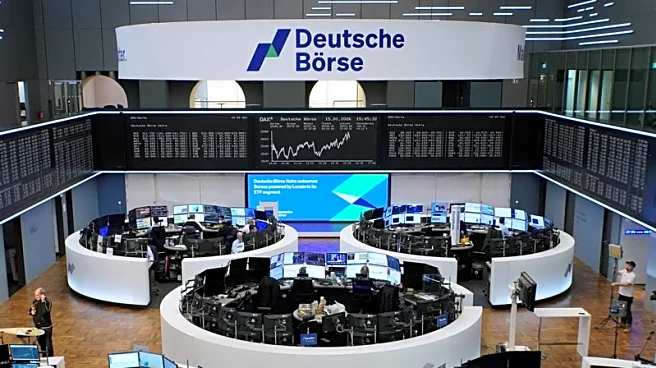What's Happening?
General Motors (GM) has seen a significant rise in its stock value as the company adapts to new tariffs and reevaluates its electric vehicle strategy. The Detroit-based automaker is investing $5 billion
to scale up domestic production, aiming to manufacture 2 million vehicles annually. This move is supported by a policy extension that provides relief to U.S. companies operating in Mexico and Canada. GM has reduced its anticipated tariff costs to between $3.5 billion and $4.5 billion annually, with expectations to offset these costs by the end of 2026. Despite a $1.6 billion charge related to its EV strategy adjustment, GM's shares rose by 14% on Tuesday, reaching new highs for 2025.
Why It's Important?
The developments at GM highlight the resilience of domestic car manufacturers in the face of changing environmental policies and trade conditions. The company's ability to quickly adapt to tariffs and reassess its EV strategy is crucial for maintaining competitiveness in the automotive industry. The rise in GM's stock suggests investor confidence in the company's strategic direction, particularly as it increases its domestic manufacturing footprint. This could have broader implications for the U.S. automotive sector, potentially influencing other manufacturers like Ford and Tesla, who are set to report their earnings soon.
What's Next?
GM's strategic adjustments may lead to further changes in its EV plans, as the company anticipates lower near-term EV adoption than initially planned. The ongoing reassessment could result in additional charges, but GM aims to reduce EV losses by 2026. The company's focus on increasing domestic production and sourcing may also impact its long-term competitiveness. Stakeholders will be watching closely as Ford and Tesla report their earnings, which could provide further insights into the industry's response to evolving trade and environmental policies.
Beyond the Headlines
The shift in GM's strategy underscores the broader challenges faced by the automotive industry in balancing environmental goals with economic realities. The reduction in federal tax credits for EVs and changes in emissions standards may influence consumer behavior and industry practices. GM's proactive approach to addressing overcapacity and reassessing its EV strategy could set a precedent for other manufacturers navigating similar challenges.











